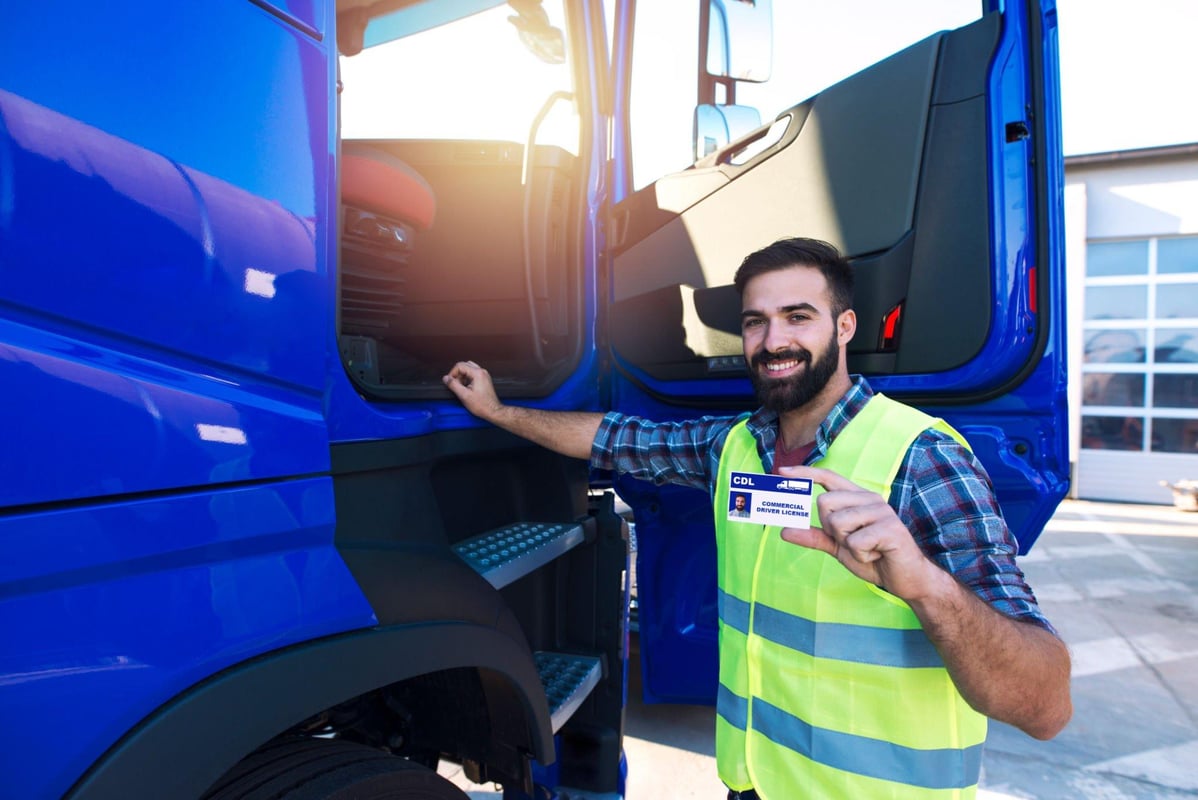CDL-B classes near me in Cape Coral
In the Cape Coral metro area, the average cost of a CDL-B class is $2850 and the average class length is approximately 3 weeks long
Trade and industry classes near
Fort Myers, FL 33901Online classes
Financial aid

Liberty University Online
BS: Civil Engineering
- Online, completion in as little as 48 months.
- Option to transfer credits for up to 75% of the entire degree.

Southern New Hampshire University
BS Operations Management with concentration in Logistics and Transportation
- Complete your degree at your own pace
- 24/7 online accessibility

Southern New Hampshire University
MS Management with concentration in Construction Management
- Learn to manage essential project teams
- Program accredited by ACBSP
Programs not available on Dreambound
H&R Elite Trucking Academy
Class B
- Learn to operate vehicles over 26,000 pounds
- Hands-on training with a combination of classroom and driving experience
$3,600 total
CDL College
Air Brakes Endorsement
- Free CDL Permit Classes
- Online ELDT CDL Courses
No cost info
Center for Employment Education
Online Commercial Driver's License Class B (CDL-B) Classes
No cost info
SunState CDL
In person Commercial Driver's License Class B (CDL-B) Classes
SunState CDL's Class B Commercial Driver's License program is designed to provide comprehensive training and prepare students for a career in commercial driving. The program offers a combination of in-class theoretical instructions and hands-on driving experience to ensure participants obtain the skill set required to safely and efficiently operate Class B commercial vehicles. Upon completion of the program, students are equipped with the knowledge and experience needed to take and pass the CDL-B licensing exam, opening doors to various commercial driving career opportunities.
No cost info
CDL-B Classes Near Me in Cape Coral
Introduction
The world of vocational training offers a wide array of opportunities to get certified in practical skills that are high in demand. One such training is for the Commercial Driving License of Class B, also known as CDL-B. This blog post will provide comprehensive information about CDL-B classes, the requirements, what to look for in a class, and how to navigate the certification process. We'll also guide you on how you can find related jobs and what other classes you might consider after obtaining a CDL-B.

What is a CDL-B?
A CDL-B is a type of commercial driver's license that qualifies you to operate vehicles with a Gross Vehicle Weight Rating (GVWR) of more than 26,000 pounds, or that are towing vehicles not exceeding 10,000 pounds. It also allows the driver to transport up to 16 passengers (including yourself as the driver).
Training Requirements
The training requirements for a CDL-B typically include:
-
A high school diploma or equivalent
-
Being at least 18 years old (21 if you want to drive interstate)
-
Having a clean driving record
-
Passing a physical examination
Each state might have additional requirements, so it's essential to check with your local DMV or a reputable training provider in your area.
What to Look for in a Class
When searching for a CDL-B class, it's crucial to consider the following factors:
-
Course Content: The class should cover all the topics required by the Federal Motor Carrier Safety Administration (FMCSA), including vehicle inspection, basic control of the vehicle, safe driving practices, and more.
-
Hands-on Training: Practical experience is vital in this field. The class should provide ample time driving the type of vehicle you'll be licensed to operate.
-
Qualified Instructors: The instructors should be experienced, certified professionals who can provide quality training and useful tips from their own experience.
-
Class Size: Smaller class sizes allow for more personalized instruction and more driving time.
-
Job Placement Assistance: Some providers offer assistance with job placement after course completion, which can be a valuable resource when starting your career.
What to Expect from the Day-to-Day Class
The day-to-day class typically involves both classroom instruction and behind-the-wheel training. In the classroom, you'll learn about safety rules, driving regulations, and vehicle maintenance. The practical training involves learning and practicing maneuvers, such as backing up, turning, and parking.
What Does the Certification Process Look Like?
The certification process for obtaining a CDL-B involves passing a written test and a skills test. The written test covers topics such as road signs, traffic laws, and safe driving techniques. The skills test involves demonstrating your ability to inspect a vehicle, perform basic maneuvers, and drive safely on public roads.
How to Find Related Jobs
Once you've obtained your CDL-B, you can start looking for jobs in industries such as transportation, construction, waste management, and more. You can find job postings on various job boards, company websites, and networking events.
What Other Classes Someone Can Take After Becoming a CDL-B
After obtaining a CDL-B, you might consider taking additional classes to enhance your skill set and increase job opportunities. These could include:
-
CDL-A Training: A CDL-A allows you to drive any vehicle that a CDL-B allows, plus any tractor-trailer combinations.
-
Endorsement Courses: These courses offer specialized training for specific types of vehicles or materials, such as tank vehicles, hazardous materials, or school buses.
-
Defensive Driving Classes: These classes teach techniques to avoid accidents and handle various road conditions and hazards.
Now, let's discuss some additional topics related to CDL-B classes.
Safety Regulations and Compliance
Understanding safety regulations and compliance is crucial for commercial drivers. Therefore, a good CDL-B class should offer comprehensive training on these aspects. This involves understanding the Federal Motor Carrier Safety Regulations (FMCSRs) and the state-specific regulations applicable to commercial drivers.
CDL-B Versus CDL-A
While both CDL-B and CDL-A licenses allow you to drive commercial vehicles, the main difference lies in the type and size of the vehicles you're permitted to drive. A CDL-A license allows you to drive tractor-trailer combinations and any vehicles covered under CDL-B and CDL-C. In contrast, a CDL-B license permits you to drive single vehicles with a GVWR of 26,001 pounds or more or a vehicle towing another vehicle not exceeding 10,000 pounds.
Advanced Driving Skills
Advanced driving skills are essential for commercial drivers. This includes understanding how to handle large vehicles, navigate through traffic, deal with hazardous road conditions, and understanding vehicle dynamics. Advanced driving classes can provide these skills, making you a safer and more efficient driver.
Maintaining Your CDL-B
Maintaining your CDL-B involves keeping a clean driving record, passing periodic physical examinations, and staying updated with the latest safety regulations and driving techniques. It's also crucial to renew your license as required by your state's regulations.
Final Thoughts
Embarking on a career as a commercial driver with a CDL-B opens up a world of opportunities. It provides a solid foundation on which you can build a successful career in the transportation industry. As with any vocational training, the key is to find a quality training provider that offers comprehensive training and practical experience. You can find more information about vocational training programs in Florida at Dreambound.com. Remember, success in this field depends not only on your driving skills but also on your understanding of safety regulations, vehicle maintenance, and advanced driving techniques.
For further reading, you may want to learn about becoming a truck driver in Florida or how to become a HVAC technician in Florida. These professions also require vocational training and offer rewarding career paths.
With Dreambound's comprehensive collection, understand the certification process in this field for different cities. Looking for info on other states? Our additional guides are here to help.
- How to Become a School Bus Driver in Alabama
- How to Become a School Bus Driver in Kentucky
- How to Become a School Bus Driver in Maryland
- How to Become a School Bus Driver in New Jersey
- How to Become a School Bus Driver in Vermont
Weighing the possibilities of a career shift ? Dreambound has written many extensive guides to guide you in making informed decisions. Check out some of these resources below:
FAQ
What is Dreambound?
Dreambound's platform has the largest number of options for students to find career & technical education. While we can't guarantee any career outcomes, our mission is to provide you with the information you need to find a program that helps you start your new career journey.
What programs do you offer?
Dreambound has over 70 programs across healthcare, technology, business, and industrial trades. This includes programs such as Medical Billing, Cybersecurity, and welding.
Do you offer financial aid?
Some of our schools offer financial aid for those who qualify. Many others offer payment plans, where you can pay the cost of class over time.
Is it possible to do online classes?
Yes, Dreambound offers many online programs. On Dreambound's search, you can filter by online, in-person, and hybrid (part online, part in-person).
